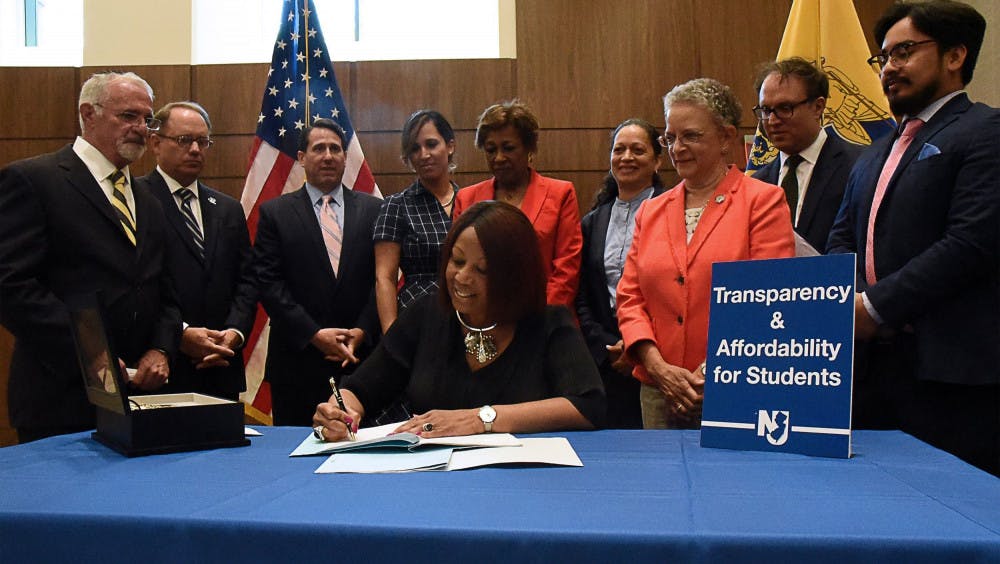Acting Governor Sheila Oliver was welcomed to Seton Hall’s South Orange campus by President Joseph Nyre on July 31 to sign two pieces of legislation into law, targeted at improving college affordability and cost transparency. Oliver and Nyre were joined by other state officials including Director of Higher Education Student Assistance Authority Executive David Socolow, Department of Banking and Insurance Commissioner Marlene Caride and Deputy Secretary of Higher Education Diana Gonzalez to celebrate the signing.
“We are pleased that you chose our University as the place to sign this historic legislation and we are honored that you recognize Seton Hall's efforts to make higher education more affordable and more accessible,” Nyre said at the ceremony, noting that he joined the Navy in part to help pay for college. “At the end of the day, we share a common goal, and that is to have students graduating focused on their futures rather than on how to pay for their pasts.”
The first piece of legislation, NJ S2046, will require colleges to create “shopping sheets,” which will be included with prospective student’s financial aid offer packages. The sheets will consist of information such as costs, loan options and estimated debt levels after graduation. Additionally, the bill will require New Jersey institutions to take measures to become more transparent on costs, such as by publicizing how and where mandatory student fees are being used.
New Jersey State Assemblyman Raj Mukherji — a prime sponsor of the bill — said that the new law will mark an important step forward in cost transparency for students.
“Students sometimes pay upwards of $2,000 in fees alone each semester on top of tuition that goes up year after year,” Mukherji said. “Increasing transparency and accountability, along with the creation of a standardized financial aid shopping sheet, are just a few steps we can take to help students who continue to incur debt in pursuit of their dreams.”
NJ S1149, the second of the two bills to be signed into law by Oliver, aims to crack down on predatory lending by strengthening regulation over loan servicing companies. Loan servicers will now be required to be licensed by the New Jersey Department of Banking and Insurance (DOBI) to operate in the state and will ban companies from engaging in deceptive practices such as misrepresenting the amount of fees owed by borrowers, among other things.
The law also provides for the creation of a student loan ombudsman within the DOBI who will be responsible for helping borrowers with complaints or questions about loan servicing, as well as monitoring and reviewing claims against servicers.
The two pieces of legislation are part of Governor Phil Murphy’s plan for higher education reform which was announced back in March. The project — titled “Where Opportunity Meets Innovation” — has been spearheaded by Murphy and Secretary of Higher Education Zakiya Smith-Ellis as a “student-centered approach" geared at lowering the cost of college and improving overall access. The plan established five working groups to help address problems New Jersey college students face.
“This issue is personal for me,” Smith-Ellis said in a press release about the two new laws. “I worked with students first-hand figuring out how to pay for college and then went on to develop the original Department of Education Financial Aid Shopping Sheet during the Obama administration. Those experiences helped me see the deficiencies in our aid information system. No student should be left in the dark about what college costs or whether their financial aid is a grant or a loan.”
At the ceremony, Oliver asserted that these new laws are a part of the administration’s broader efforts to make college more affordable.
“We have seen the negative impact that predatory lenders and misinformation can have on our students,” Oliver said. “These vital new consumer protection laws will help to protect and support them as they pursue postsecondary education.”
Axel Esquivel, a member of the student advisory board for the Higher Education Student Assistance Authority and rising senior at Seton Hall, introduced Oliver at the ceremony, praising her record and commending the legislation for providing more cost transparency to prospective students. Esquivel noted that that understanding the cost of college was of the “utmost importance” to his family and many others when shopping around for schools, and greater transparency will benefit students and families across the state.
In a Facebook post celebrating the signing, Oliver said that she was “proud to sign legislation continuing the work of the New Jersey Office of the Secretary of Higher Education to make college more affordable and transparent.”
The event was not without some criticism, though, particularly in the wake of the recent announcement from the University that tuition rates would rise 3.9% for the second year in a row.
Under a post from Seton Hall’s official Instagram page publicizing Tuesday’s event, one user, @cat.dinapoli, wrote: “How about lowering the outrageously expensive tuition to begin with?”
According to University spokesman Dan Klamanson, Seton Hall recently increased its need-based student aid in an effort to continue to address affordability while “continuing to provide exceptional academic and support programs for our students.”
“The governor’s office chose Seton Hall because we are a leader in transparency and have been cited as a model,” Klamanson said. “In terms of impact from the legislation, for years Seton Hall students have experienced the type of transparency this legislation now mandates for all the state’s colleges.”





